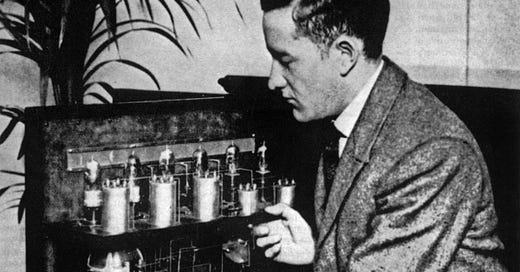Trump condemns neocons, nation builders and interventionists
They 'wrecked far more nations than they built'
Speech underpins logic of national spheres of interest
Challenges mantra of Cold War, 'humanitarian' wars and regime change
Propaganda that goes back to the British manipulation of U.S. into wars
As fact checkers double down on ignorance as strength
Previously:
Trump Peacemaker Or Man Beyond Time - The pace of change has accelerated rapidly within weeks (May 15, 2025)
Why Europe Doesn't Want Peace - It forgets that it drew its civilisation from the East (Mar 01, 2025)
Related
War Special: MI6 & Zelenskiy; Russia's Advance; Israel's Strategy - Who is making war and why? (Oct 27, 2024)
MAD Nukes, Fire & Covid - Horrors of war and breaking the simulation (Oct 16, 2024)
October 7 Anniversary Or World War Three - U.S. voters oblivious to nature of the war party (Oct 07, 2024)
Fabians, Milner Group And War - Britain commits to Ukraine, cuts pensions, announces austerity (Jul 29, 2024)
Plague, War, Famine... Africa Next - As war in Ukraine runs its course, the chaos makers may be shifting their focus (May 31, 2022)
Spies, Dupes and Charities - Rivals for Power, Part 4. Norman Dodd and the tax-exempt foundations (Aug 07, 2021)
(1,900 words or about nine minutes of your company)
May 17, 2025
The speech of president Donald Trump in Riyadh, Saudi Arabia, is one of the most important by a president in decades.
He repudiated the forever wars and the neocon strategy that underpins them.
After signing hundreds of billions of dollars in trade deals, he set out the rationale behind his transactional approach to peace through commerce, rather than the failed logic of war.
“In the end, the so-called nation-builders wrecked far more nations than they built, and the interventionists were intervening in complex societies that they did not even understand themselves,” Trump said.
“The gleaming marvels of Riyadh and Abu Dhabi were not created by the so-called nation-builders, neocons, or liberal non-profits like those who spent trillions failing to develop Kabul and Baghdad.”
This recognition that countries have spheres of interest has been evident since his re-election.
If words are matched by deeds — a big if — this marks a change from the regime change wars of the past quarter century. It also challenges the assumptions about the virtue of war and the militarist propaganda to which Americans are subjected, from the classroom to the sports arena.
Europeans are getting a taste of the same. EU governments also send soldiers into schools to proselytize, while the state corporate media fails to challenge interventionism.
War is the assumption. The only criticism allowed is: does the intervention go far enough — formerly against the Soviet Union, then after the Cold War against any number of targets for regime change.
Of course, business deals alone do not ensure peace, especially if they are weapons sales.
The purpose of this propaganda is not merely to beat the drum for war but to obscure its legitimacy. In the case of the United States, it deflects from the authority of Congress in matters of war, in its place propounding the theory that the president, as commander-in-chief, has the ultimate say.
Likewise in Europe we see in real time how the heads of NATO and the European Commission, none of which is elected by the people, lead the charge against Russia while politicians of the leading nations, Germany, France and Britain, sound and behave like schoolboys.
One of the leading neocons, champions of regime change and "humanitarian" intervention aka "responsibility to protect" is former British prime minister Tony Blair. He reportedly has been appointed adviser to Trump's envoy Stephen Witkoff. [1]
The backstory
This takes us to the modern roots of propaganda. The role of Edward Bernays, and his book of that name, is familiar to readers. He honed his skills as a member of the Committee on Public Information under George Creel which bullied Americans into World War One.
I recall from my schooldays in England the emphasis placed in our lessons upon president Woodrow Wilson.
It was he, according to our history master, who had shaped the modern world. He had saved Britain's skin by joining America to war, declaring the world would “be made safe for democracy." It was he who through the Versailles conference had tried, in vain it turned out, to tame Germany. Above all, it was Wilson who proposed the League of Nations, and who would be vindicated by the eventual creation of the United Nations.
Wilson was the American president with whom one could identify: it was not that you won or lost— but how you played the game.
We may have been taught (I don't remember) that Wilson had been elected in 1912 on a platform of keeping America out of Europe's looming war.
I am certain we were not taught of Wilson's éminence grise, his handler: a Texas politician (think big oil) whose father was English (a blockade runner during the Civil War, in other words financier) named Edward Mandell House. He is arguably one of the most important Americans of the 20th century. [2]
House spotted a rising star (are you kidding?) a university administrator who had been adopted by the Democratic Party which perceived Wilson's professorial image would strengthen their campaign against trusts, as monopolies were called. In 1911 he became governor of New Jersey, winning the presidential election the next year.
Such a trajectory should raise eyebrows, not least since House chronicled his protégé in a 1912 novel: Philip Dru: Administrator: A Story of Tomorrow, 1920-1935. The historian John Milton Cooper argues that the book was ghostwritten. All agree that the book not only was a programme but most of its platform was implemented by Wilson. [3]
Keep reading with a 7-day free trial
Subscribe to Moneycircus to keep reading this post and get 7 days of free access to the full post archives.



